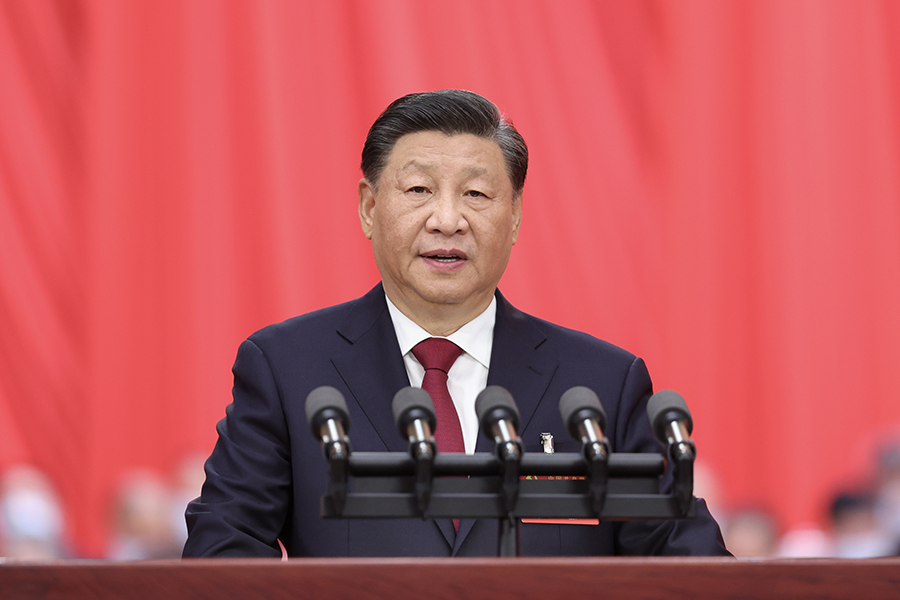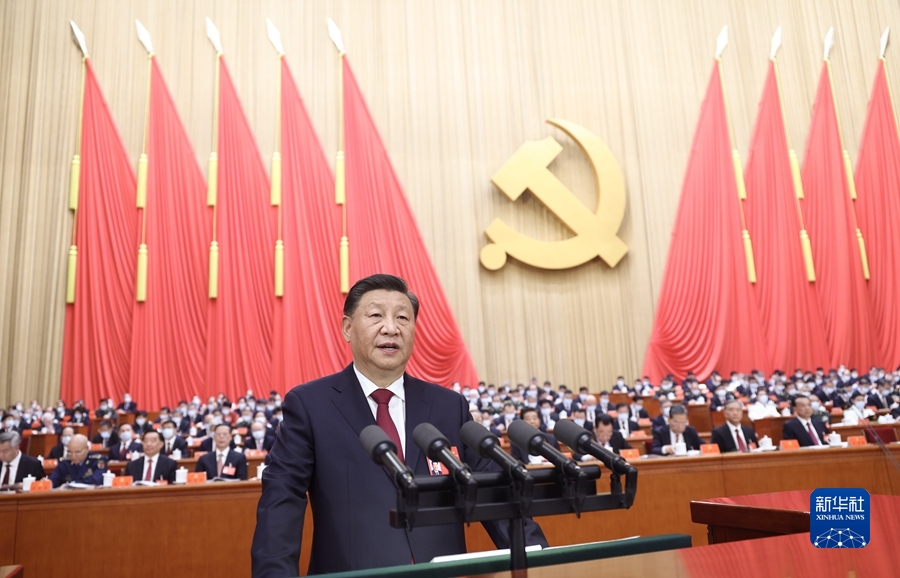
Xi Jinping delivers a report to the 20th National Congress of the Communist Party of China (CPC) on behalf of the 19th CPC Central Committee at the Great Hall of the People in Beijing, capital of China, Oct. 16, 2022. The 20th CPC National Congress opened on Sunday. [Photo by Yao Dawei/Xinhua]
By Daryl Guppy
The first priority for every government is to increase the prosperity of its people, and although largely ignored in Western media, this objective was the foundation of Xi Jinping's report at the opening session of the 20th National Congress of the Communist Party of China.
Ensuring economic prosperity in a lower growth environment is the key challenge he discussed. He explained how the policy objective of common prosperity is enhanced by the green and digital economy.
He acknowledged that China has won the largest battle against poverty in human history but recognized that this is just the beginning of the task of building a common prosperity that avoids the extremes of poverty or excessive wealth seen elsewhere.
Common prosperity does not leave sections of the community behind. This requires putting "agricultural and rural development first." China must "consolidate and expand achievements in poverty alleviation, and reinforce the foundations for food security on all fronts," he said.
Western countries use their taxation systems to redistribute excessive wealth so that governments can provide a better spread of services. In contrast "China will improve the system of income distribution" Xi said. "We will promote equality of opportunity, increase the incomes of low-income earners, and expand the size of the middle-income group," he said. These measures provide the impetus to expand the consumer economy.
This is a commitment to adjust the structure of economic activity to prevent excesses. High quality development rather than speed of development is the new requirement and this is reflected in the focus on the green economy. This requires a system-wide approach to the conservation of China's diverse geography of forests, mountains, waters, farmlands, grasslands, and deserts.
"We will promote concerted efforts to cut carbon emissions, reduce pollution, expand green development, and pursue economic growth," Xi said. This not only benefits China, but is an essential commitment to the global challenge of climate change.
"Based on China's energy and resource endowment, we will advance initiatives to reach peak carbon emissions in a well-planned and phased way in line with the principle of building the new before discarding the old," Xi said.

Xi Jinping delivers a report to the 20th National Congress of the CPC on behalf of the 19th CPC Central Committee at the Great Hall of the People in Beijing, China, October 16, 2022. [Photo/Xinhua]
The challenge is how to sustain growth in a way that supports the objective of achieving common prosperity.
Part of the solution comes with striking a balance between the role of the market economy and a high-standard socialist market economy. "We will work to see that the market plays the decisive role in resource allocation and that the government plays its role better," Xi said. This is welcome news for financial markets and confirms the path towards market maturity remains open.
As another part of the solution, China will make sure that the implementation of the strategy to expand domestic demand is integrated with the efforts to deepen supply-side structural reform, Xi said. This includes increasing the dynamism and reliability of the domestic economy while engaging at a higher level in the global economy.
This further advances the dual circulation strategy designed to improve China's self sufficiency and reduce reliance on exports as a primary driver of growth. The objective includes a "positive interplay between domestic and international economic flows."
It means China will move more quickly to build a modernized digital economy which underpins domestic and international growth. China is committed to its fundamental national policy of opening to the outside world and pursues a mutually beneficial strategy of opening up, Xi said, indicating that China will continue to engage with the international community and work to secure appropriate recognition.
China wants to contribute its share to building an open global economy that delivers greater benefits to all peoples, he said. This commitment stands in strong contrast to the efforts of the United States to strangle the open economy with sanctions.
China's engagement with the open global economy is also achieved by promoting high-quality development of the Belt and Road Initiative. He confirmed China wants to play an active part in the reform and development of the global governance system.
China upholds true multilateralism, promotes greater democracy in international relations, and works to make global governance fairer and more equitable, Xi said. This is a commitment that the United States is uncomfortable with because it challenges their hegemony. However, it is the continuation of China's legitimate desire to be more fully involved in the structure of the global economy.
Western commentators were quick to ignore most of his speech as they concentrated on his remarks about China's Taiwan region and preserving State sovereignty. Their commentary ignored his commitment that "We will continue to strive for peaceful reunification with the greatest sincerity and the utmost effort.
Xi's address placed the economic and social policy objectives within the unifying context of the common prosperity strategy. This integrated approach sets enduring foundations of future high quality economic development that brings prosperity to the people of China.
Daryl Guppy is an international financial technical analysis expert. He has provided a weekly Shanghai Index analysis for media for the Chinese mainland for more than a decade. Guppy appears regularly on CNBC Asia and is known as "The Chart Man." He is a national board member of the Australia China Business Council.

 中文
中文



